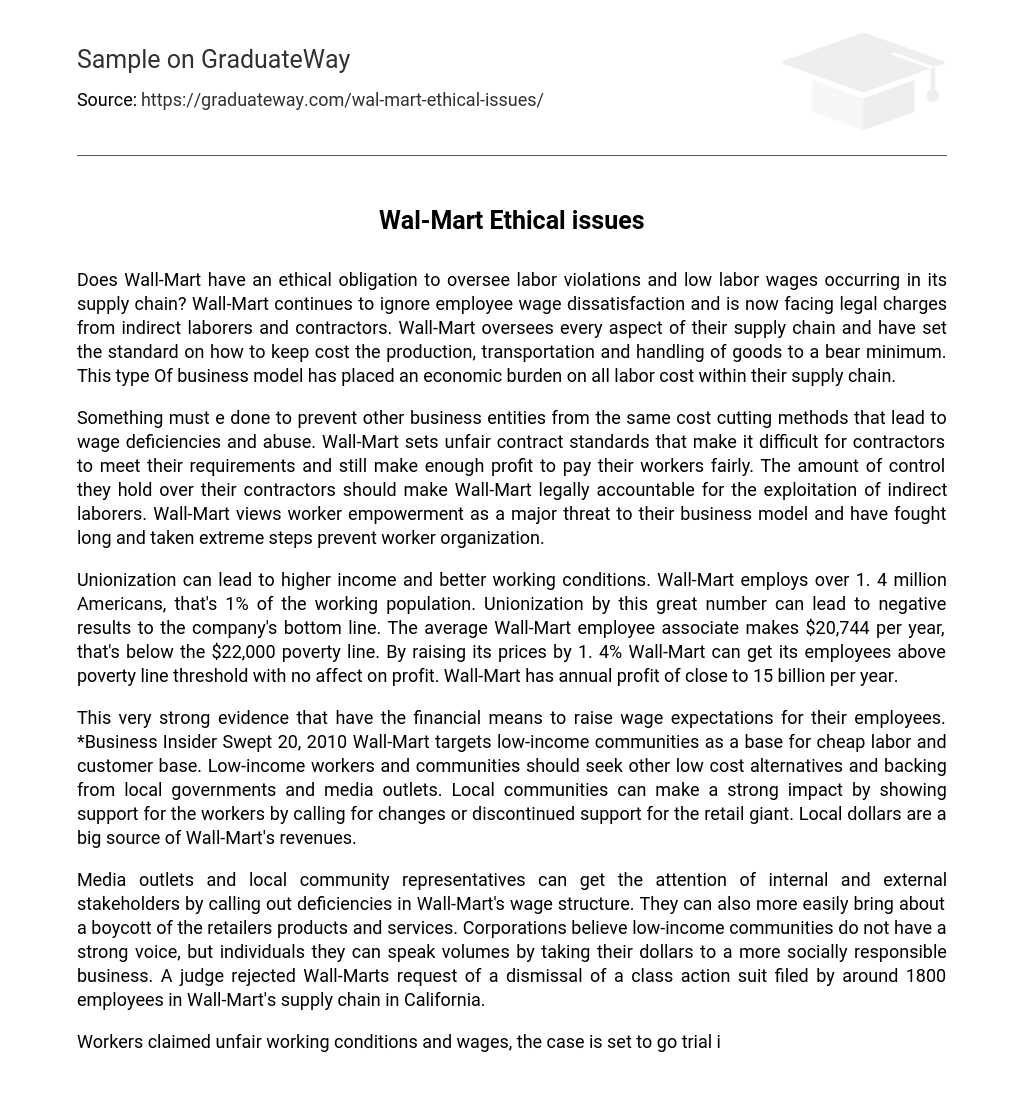Is Wall-Mart accountable for labor violations and low wages in its supply chain? The company is notorious for disregarding employee concerns about wages and is presently confronting legal accusations from indirect workers and contractors. Nevertheless, Wall-Mart closely oversees all aspects of its supply chain and has set a standard for reducing costs in the production, transportation, and handling of goods. This specific business model has resulted in increased financial strain on labor expenses across the entire supply chain.
It is necessary to take action in order to prevent other businesses from using similar cost-cutting techniques that lead to low wages and mistreatment of employees. Wall-Mart enforces unfair contract standards, making it difficult for contractors to meet their responsibilities while still providing fair pay for their workers. Due to the extensive control Wall-Mart has over its contractors, there should be legal consequences for the exploitation of indirect workers. The obstruction of worker organization is a major concern for Wall-Mart’s business model, prompting them to employ drastic measures.
Unionizing at Wall-Mart has the potential to enhance income and working conditions for its 1.4 million American employees, representing 1% of the total workforce. However, a large number of unionized workers may have a negative impact on the company’s financial performance. It is important to note that the average annual salary for a Wall-Mart employee is $20,744, which is below the poverty line of $22,000. Nevertheless, Wall-Mart can raise employee income above the poverty line without affecting its profit margin by increasing prices by just 1.4%. It is crucial to emphasize that Wall-Mart earns an impressive yearly profit of nearly $15 billion.
This is important evidence suggesting that businesses like Wall-Mart have the financial resources to raise their employees’ salary expectations. According to Business Insider, Wall-Mart specifically targets low-income communities for both cheap labor and as a target customer group. It is advised that low-income workers and communities consider cost-effective alternatives and seek assistance from local governments and media organizations. By uniting with the workers, advocating for reforms, or withdrawing support from this retail giant, local communities can make a meaningful impact. It should be recognized that Wall-Mart’s revenue heavily depends on money spent by local residents.
Media outlets and local community representatives can use their influence to bring attention to the flaws in Wall-Mart’s wage system and generate interest from both internal and external stakeholders. They also have the ability to help coordinate a boycott of Wall-Mart’s products and services. Despite assumptions by corporate entities that low-income communities lack power, individuals can still make a substantial impact by redirecting their spending towards businesses that prioritize social responsibility. A class action lawsuit filed by approximately 1800 employees in Wall-Mart’s California supply chain has been denied dismissal by a judge.
Workers alleged unfair working conditions and wages, with the case scheduled for trial in summer 2015. If Wall-Mart is severely penalized, this will establish a new benchmark for the treatment of low-wage contract workers among retailers nationwide. The legal system’s punishment of Wall-Mart will serve as a deterrent and demonstrate that other retailers adopting similar unethical practices will also face consequences and be held accountable. Given the media attention surrounding the case, constituents will anticipate leaders and politicians to address the issue and advocate for reforms.
This case will inspire others to bring forth their own legal claims, spurring Wall-Mart to implement lasting changes in their treatment of employees. If they do not take action, additional detrimental lawsuits may arise. The Board of Directors of Wall-Mart possesses the authority and obligation to make critical decisions and supervise the company’s operations. In instances of severe negligence, courts now have the capacity to “pierce the corporate veil” and directly hold leadership responsible.
As a member of Wall-Mart’s Board of Directors, our primary duty is to prioritize the interests of our investors. Our objective is to create a profitable and sustainable business model that aligns with our mission statement: “saving people money, so they can live better.” However, we acknowledge that this mission statement was formulated over fifty years ago when the company functioned as a small-scale store. Hence, it might not fully represent the current business environment and societal requirements.
We are a company valued at 500 Billion dollars, with a workforce that represents a significant percentage of the working population in various countries. It is crucial for us to consider the impact of our decisions on both internal and external stakeholders. While we prioritize saving money for our customers, we must also ensure their well-being, both financially and health-wise.
Currently, our business model relies on sourcing products at lower costs and negotiating better prices. However, this approach often exhausts suppliers’ resources and may involve importing products from overseas suppliers with inadequate quality standards that subject their workers to slave wages and harsh working conditions.
Our business model requires paying our “associates” the lowest wages in the industry. Furthermore, we are currently confronted with accusations of employing unethical strategies to hinder our employees from forming unions. By persisting with our current business model, we will not only sustain a loss of trust from both customers and employees but also encounter more detrimental lawsuits similar to the one concerning our supply chain contractors. Thus, it is imperative that we proactively take measures to mend relationships with customers who have been lost as a result of our inactivity.





